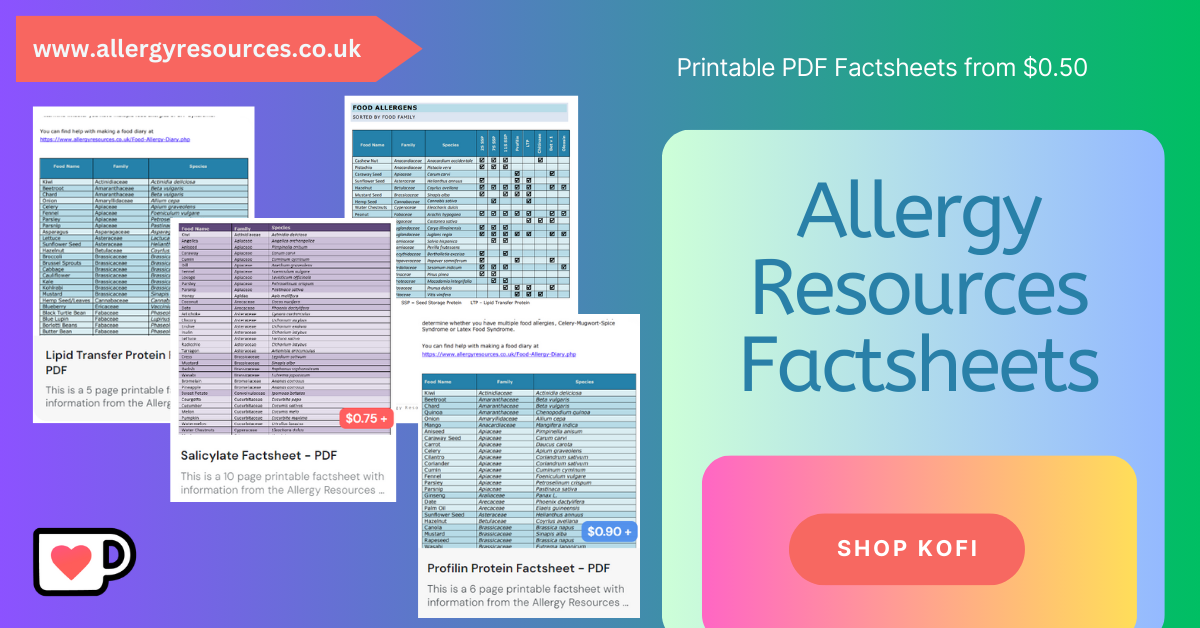
PERSIMMON ALLERGY
Key Allergens
Persimmon fruit (also called kaki fruit, persimon and sharon fruit) are in the Ebenaceae family of plants.
Persimmons are rarely linked to food allergy, to date there are no recorded allergens for persimmon by the World Health Organization (WHO), because there have not been enough study into allergic effects from this food. If you are interested in what is needed by the WHO before they add an allergen to their allergen database you can check that out HERE.
The main allergens in persimmons are profilin proteins, which are panallergens responsible for more severe allergic reactions in seemingly unrelated food.
Persimmon fruit also contain Bet v 1-like proteins. These proteins are similarly shaped to those ones in birch pollen and can cause oral allergy type symptoms.
A recent study in 2023 has suggested that persimmons contain Chitinase Proteins, which would link them to Latex Allergy and Thaumatin Proteins. Both of these proteins are panallergens with the potential to cause serious allergic reactions to those sensitised to them.
Persimmons are rarely linked to food allergy, to date there are no recorded allergens for persimmon by the World Health Organization (WHO), because there have not been enough study into allergic effects from this food. If you are interested in what is needed by the WHO before they add an allergen to their allergen database you can check that out HERE.
The main allergens in persimmons are profilin proteins, which are panallergens responsible for more severe allergic reactions in seemingly unrelated food.
Persimmon fruit also contain Bet v 1-like proteins. These proteins are similarly shaped to those ones in birch pollen and can cause oral allergy type symptoms.
A recent study in 2023 has suggested that persimmons contain Chitinase Proteins, which would link them to Latex Allergy and Thaumatin Proteins. Both of these proteins are panallergens with the potential to cause serious allergic reactions to those sensitised to them.
Food Intolerances


Persimmon fruit is a low FODMAP food. FODMAP stands for Fermentable oligosaccharides, disaccharides, monosaccharides and polyols. Foods high in FODMAPs can cause symptoms of food intolerance, affecting the gastro intestinal system and this can be mistaken for a true IgE food allergy.
Persimmon is a food low in salicylates. Salicylates have the potential to cause worsening of asthma, swelling, itching and hives as well as food intolerance symptoms in people who are sensitive to salicylates.
You can read more about Food Intolerances on the dedicated Food Intolerance Page.
Associated Syndromes
Allergy to persimmon can be linked to Celery-Mugwort-Spice Syndrome, which is a subtype of Pollen Food Allergy Syndrome. This syndrome affects individuals who have become sensitised to pollen and then have oral allergy type symptoms to foods with similarly shaped proteins. The most common form of Pollen Food Allergy Syndrome is the one caused by birch tree pollen. In Celery Mugwort Spice Syndrome the sensitising pollen is mugwort.
You may have Pollen-Food Allergy Syndrome if you suffer from persimmon allergy with oral allergy symptoms to 3 or more of the foods mentioned in cross reactivity section.
There is a link between persimmon and Latex Food Syndrome. The plant involved in latex allergy Hevea brasiliensis, the rubber tree plant, has an allergen called Hev b 8 which is a profilin protein. Those very sensitised to latex may have a contact allergic reaction from other foods or plants containing profilin or chitinase proteins, there is less evidence of this than sensitisation to other latex linked proteins like hevein and chitinases.
You may have Pollen-Food Allergy Syndrome if you suffer from persimmon allergy with oral allergy symptoms to 3 or more of the foods mentioned in cross reactivity section.
There is a link between persimmon and Latex Food Syndrome. The plant involved in latex allergy Hevea brasiliensis, the rubber tree plant, has an allergen called Hev b 8 which is a profilin protein. Those very sensitised to latex may have a contact allergic reaction from other foods or plants containing profilin or chitinase proteins, there is less evidence of this than sensitisation to other latex linked proteins like hevein and chitinases.
Cross Reactivity
Profilins are also found as food allergens in kiwi, celery, peanut, chilli, watermelon, orange, hazelnut, melon, carrot, strawberry, soya, walnut, lychee, lupin, apple, cherry, almond, peach, pear, mustard, tomato and aubergine.
Other plants containing profilin inhalant allergens are ragweed, wormwood, birch, sunflower, olive, plantain, poplar and oak.
If sensitised to birch tree pollen you may have Pollen Food Allergy Syndrome and may also react to kiwi, pear, peach, plum, nectarine, apricots, apple, tomato, celery, carrot, potato, parsnip, pepper, dill, cumin, peas, coriander, fennel, hazelnut, walnut, almonds, peanuts, lentils and beans.
Foods containing chitinase include avocado, banana, cashew nut, grape, kiwi, mango, passion fruit, pomegranate and raspberries.
Thaumatins are found in apples, bananas, peppers, celery, chilli, garlic, grapes and peaches. Thaumatins are a newer panallergen, so more foods are added to this list regularly.
These food lists are not exhaustive, the most up to date information is on the Cross Reactivity Tool.
Other plants containing profilin inhalant allergens are ragweed, wormwood, birch, sunflower, olive, plantain, poplar and oak.
If sensitised to birch tree pollen you may have Pollen Food Allergy Syndrome and may also react to kiwi, pear, peach, plum, nectarine, apricots, apple, tomato, celery, carrot, potato, parsnip, pepper, dill, cumin, peas, coriander, fennel, hazelnut, walnut, almonds, peanuts, lentils and beans.
Foods containing chitinase include avocado, banana, cashew nut, grape, kiwi, mango, passion fruit, pomegranate and raspberries.
Thaumatins are found in apples, bananas, peppers, celery, chilli, garlic, grapes and peaches. Thaumatins are a newer panallergen, so more foods are added to this list regularly.
These food lists are not exhaustive, the most up to date information is on the Cross Reactivity Tool.
Resources
Websites
Allergen Encyclopedia - Persimon Fruit
Science Direct - Persimmon Fruit
Allergy information for: Persimmon (Diospyros kaki (Kaki, persimon))
ATP Science - Salicylate Foods
Articles and Journals
About a paediatric case of persimmon allergy, 2024
Development of transplant-acquired multiple food allergies: a case series, 2024
Lipid transfer protein syndrome: How to save a life through careful education, 2022
Latex-Fruit Anaphylaxis from Persimmon, 2016
Angioedema after ingestion of persimmon fruit, 2013
Severe Allergy to Sharon Fruit Caused by Birch Pollen, 2005
Let me know if you found any of these interesting or useful.
If you spot an article or research that you think is interesting you can message me or tag me on Facebook or Twitter - links at the bottom of the page.